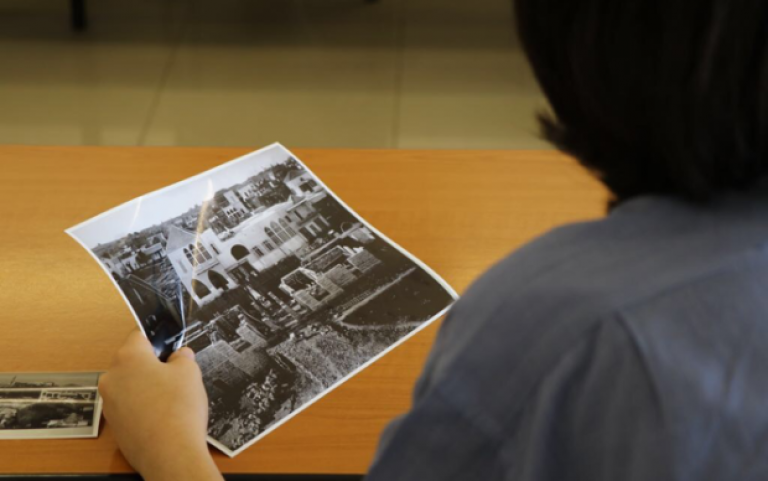New exhibition explores objects, humans and animals in ‘exile’
27 February 2019
A new exhibition at UCL seeks to highlight the role of culture and heritage in responses to humanitarian disaster and displacement.

Moving Objects: Stories of Displacement, which has just opened at UCL’s Octagon Gallery, is co-curated with refugees and forced migrants living in London and the Middle East. It explores the relationship between, and journeys of, objects, humans and animals ‘in exile’ and traces what it means to be displaced.
The exhibition draws together material objects, poems, visual pieces and archival materials selected, co-created, and analysed by people with refugee backgrounds. Many of these materials emerged through object handling, craft, writing and photography workshops in cities and camps including Beirut and Baddawi camp (Lebanon); London (UK); and Jerash, Talbieh camp and Zarqaa (Jordan).
The exhibition builds upon interdisciplinary, collaborative and participatory research projects that are working closely with communities who are simultaneously experiencing and responding to displacement.
Professor Fiddian-Qasmiyeh, Co-Director of UCL Migration Research Unit and one of the project leads, said: “Heritage is a part of the humanities that is often overlooked, but people apply and re-create different forms of heritage as everyday strategies to construct meaningful lives in displacement.
“We wanted to explore themes of heritage and wellbeing by bringing together a range of research related to refugees, wellbeing, displacement and memory. Through the exhibition and satellite events we hope to engage the public in thinking about the significance of culture and heritage in understanding and responding to displacement.”
This exhibition is presented by UCL Culture and funded through the Centre for Critical Heritage Studies Small Grants Scheme, the UCL Grand Challenges Programme, and the Department of Geography.
It draws upon two UCL-based research projects which are examining different facets of displacement in Lebanon, Jordan and the UK, and which are supported by the Economic and Social Research Council and Arts and Humanities Research Council through the Global Challenges Research Fund.
The project is jointly led by Dr Beverley Butler (UCL Institute of Archaeology), Professor Helen Chatterjee (UCL Biosciences), Alejandra Carles-Tolra and Jessy Boon Cowler (Helen Bamber Foundation, Photography Group) and Professor Elena Fiddian-Qasmiyeh (UCL Geography).
Professor Elena Fiddian-Qasmiyeh is Co-Director of UCL’s Migration Research Unit and Director of UCL’s interdisciplinary ‘Refuge in a Moving World’ research network. Through her ‘Refugee Hosts’ project, Professor Fiddian-Qasmiyeh and colleagues have been working with refugees from Syria who have sought refuge in Lebanon, Jordan and Turkey, to investigate the diverse role that history, memory, writing and heritage play in place-making and shaping encounters between refugees and their hosts.
Meanwhile, Professor Helen Chatterjee (who co-founded the Culture, Health and Wellbeing Alliance) and Dr Beverley Butler (Heritage Wellbeing Lead, UCL Centre for Critical Heritage) lead a project called ‘Forced Displacement and Cultural Interventions’ investigating the potential of the Arts to play a central role in improving the health and wellbeing of refugees and asylum seekers.
This research is led with Dr Fatima Al-Nammari and Dr Rula Al-Asir, Petra University, in partnership with the Helen Bamber Foundation in London, which supports refugees and asylum seekers who have experienced extreme human cruelty, and the Women’s Programme Centre at Talbieh Refugee Camp in Jordan.
Over spring and summer 2018, a series of workshops have been convened both in London and the Middle East. This has included workshops in partnership with the Helen Bamber Foundation, PEN-International, the Migration Museum UK and the British Council.
Professor Chatterjee, said: “We started by exploring the value of arts participation for clients of the Helen Bamber Foundation. One of the things to come out of that was that participants wanted to hold a public exhibition to challenge public perceptions of what it means to be a refugee and showcase the diversity of skills refugees and asylum seekers bring with them to the UK”
“What we are interested in now is how these activities translate to an international setting, and in particular in a refugee camp. Working in Talbieh refugee camp where they have a women’s programme we have been interested to see that the same kinds of outcomes can be achieved through arts participation including improvements in psychological wellbeing, social inclusion and reduction of isolation.”
Links
The exhibition is free and open to the public until October 2019. Visit UCL’s Octagon Gallery, Wilkins Building, UCL, Gower Street, London, WC1E 6BT.
A 'Moving Objects' symposium and launch will take place on Thursday 14 March. Register in advance for the symposium and the launch event.
- Refugee Hosts
- UCL Migration Research Unit (UCL Geography)
- Arts and forced displacement research
- Culture, Health and Wellbeing Alliance
 Close
Close

